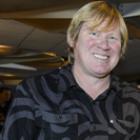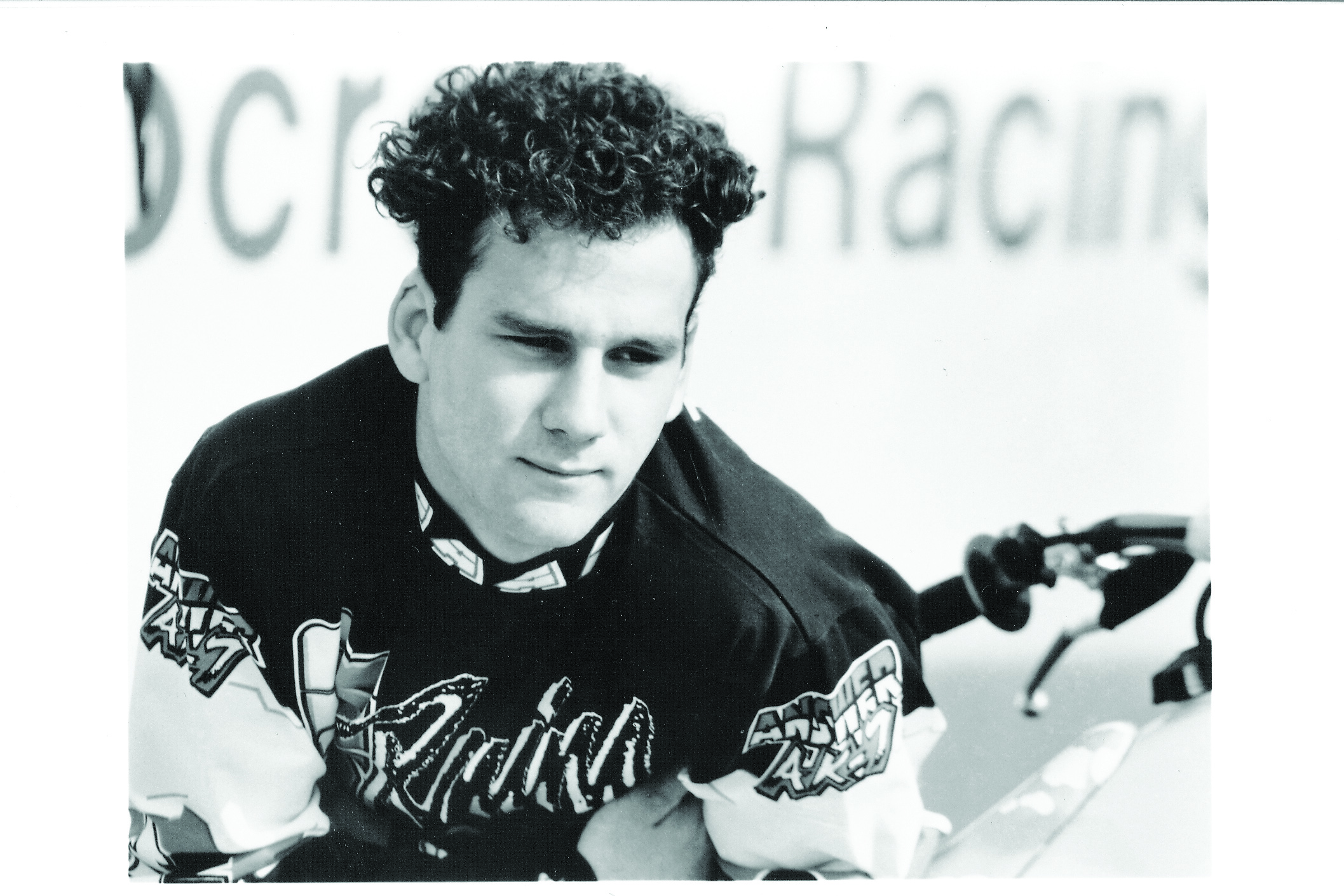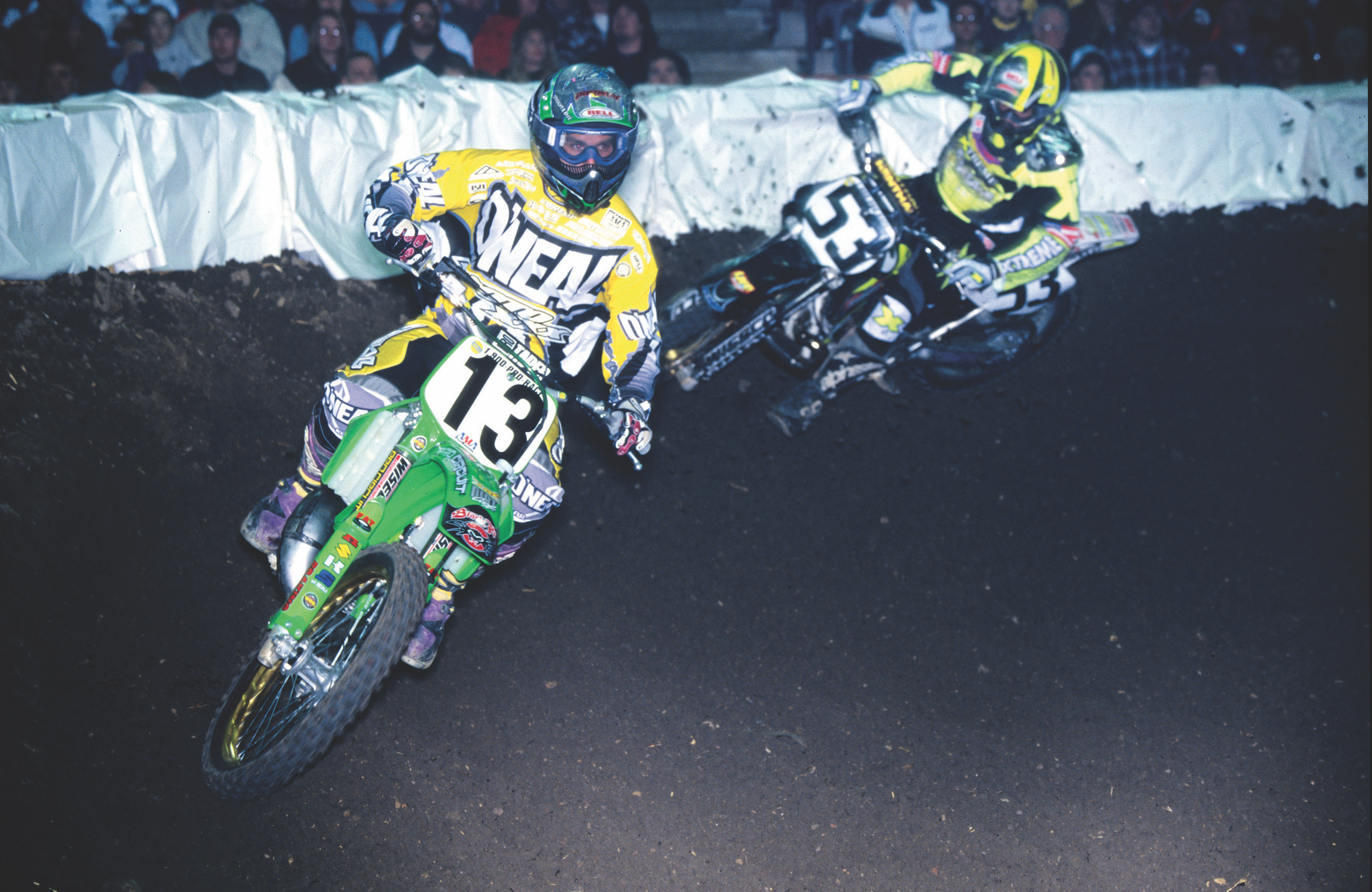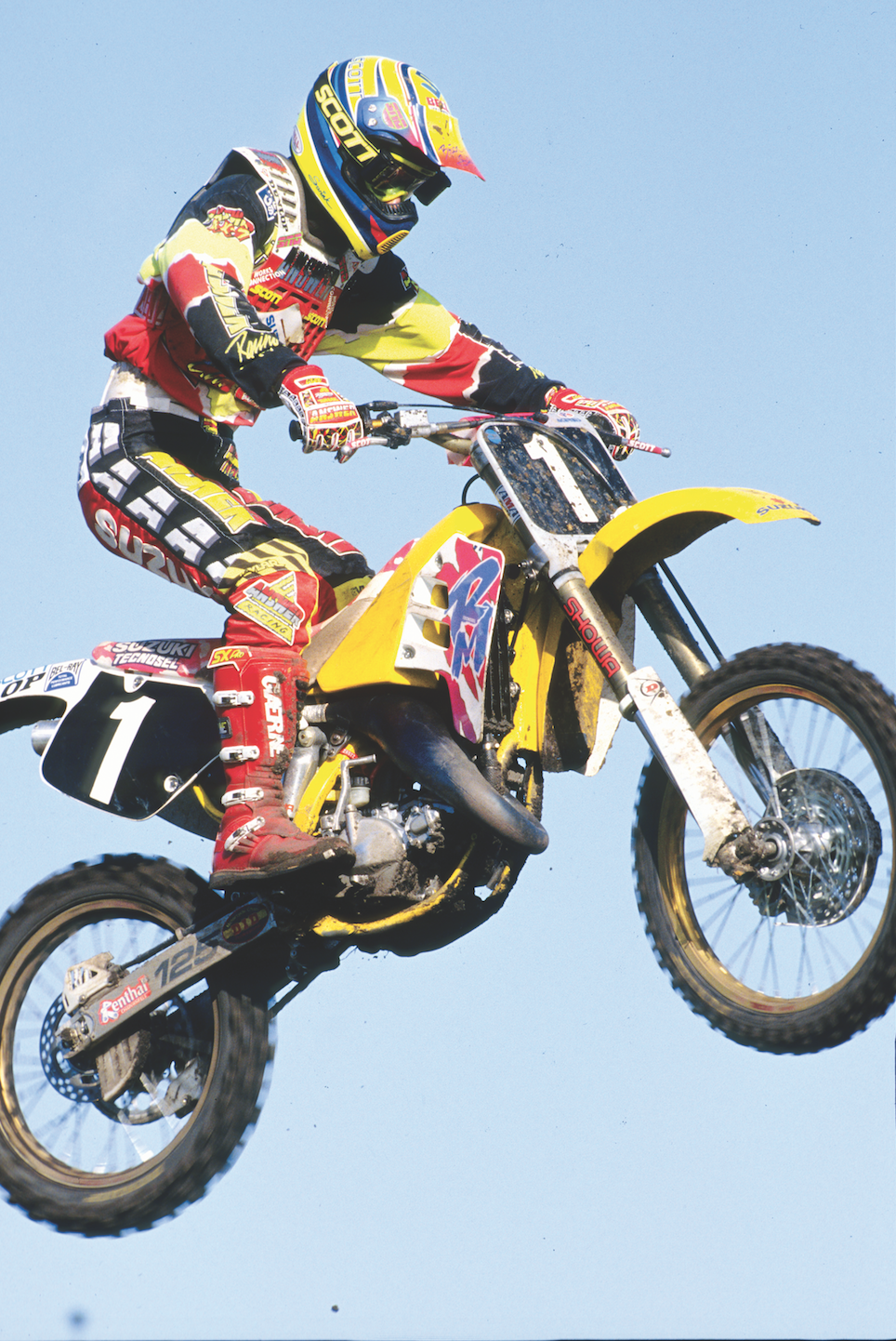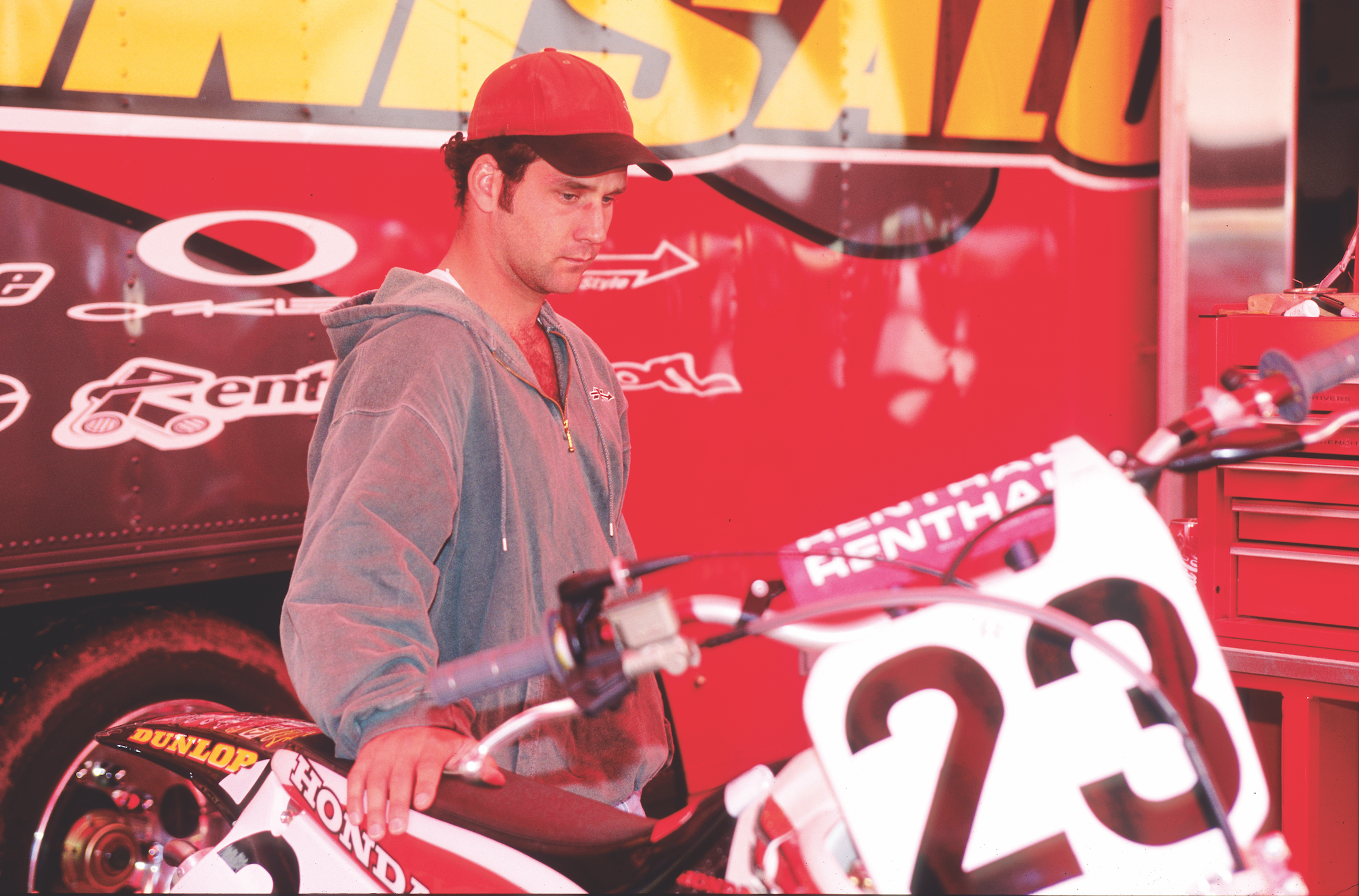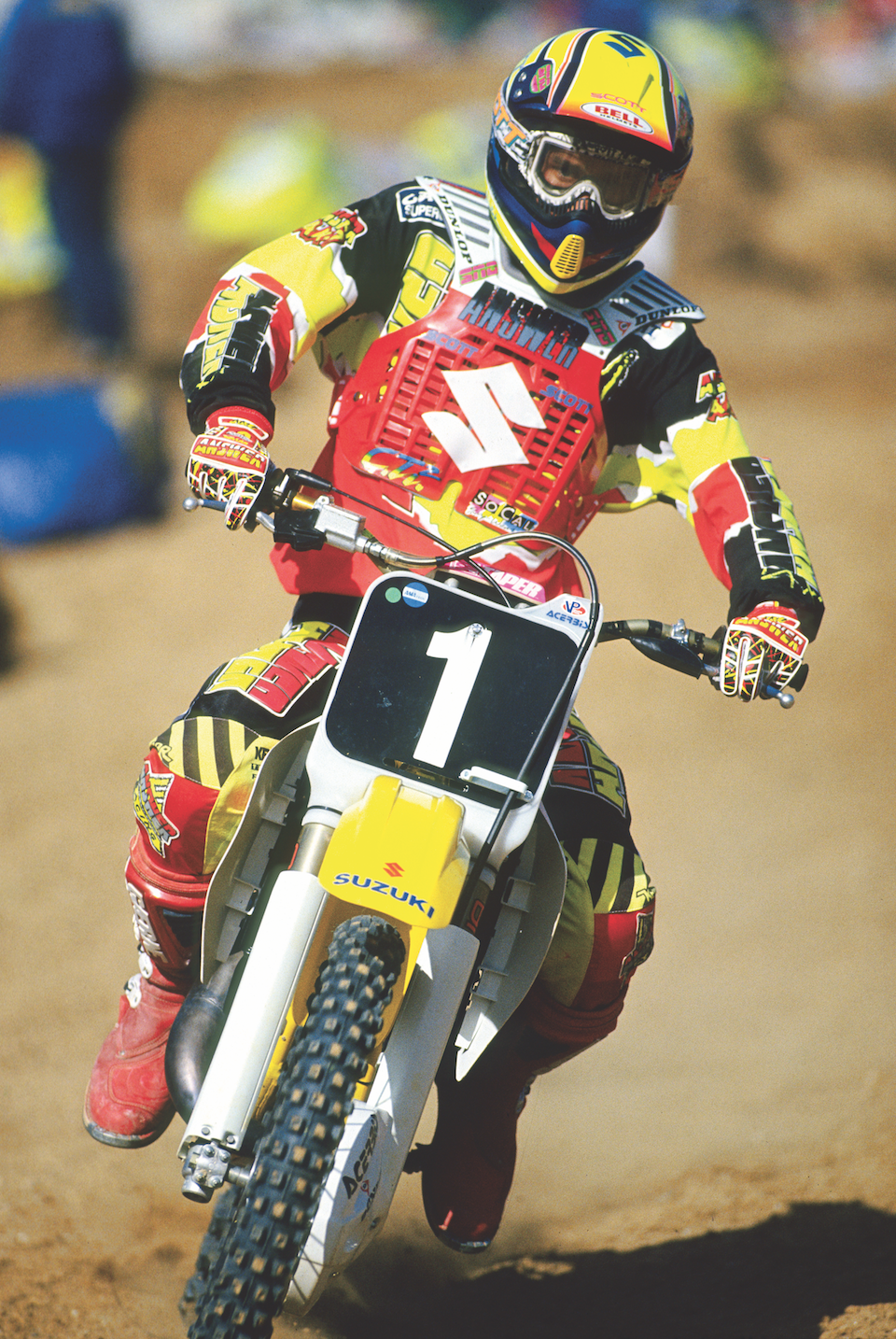Last week, at the age of 45, Brain Swink tragically passed away in his sleep. One of the fastest minicycle riders of all time, as well as one of the fastest 125cc riders ever—but only for a little while—Swink got Mitch Payton his first career win and title in 1991, riding for the then Peak/Pro Circuit Honda team. But by 1997 he was done as a pro.
This story originally ran in the March 2009 issue of Racer X Illustrated.
It was almost midnight on a Saturday in January of 1994. A few hours earlier, the first 250cc main event of the new season had finished up in Orlando's Citrus Bowl; a handful of race reporters and friends sat in a booth at a nearby Denny's, bench racing. The restaurant's doors opened and in walked Brian Swink, bundled up in a flannel jacket, hands in his pockets. He looked down. When someone asked what he thought of his ninth-place finish, Swink, a Suzuki factory rider, said. "I really don't know what it is.... It's like the more I think about it and the harder I try, the worse things go. I just can't seem to get going."
Swink was always a rider who wore his heart on his sleeve. What no one in the restaurant could have known that night was that Swink, a remarkable young rider and just three years into his pro career, was already past his prime. Once thought to have even more potential than his rookie teammate Jeremy McGrath, he didn't fade away—he completely burned out.
Today, Brian Swink lives in Gaines, Michigan, a town of 366 inhabitants. He's not that far away from Fenton, where he grew up, but his life is much different now than it was when he was on his way to six-figure factory contracts, supercross championships, high-dollar endorsement deals, and all of the rewards that come with being a phenomenal rider. Rather than practicing or training at the gym, Swink now spends his days operating heavy equipment for a living.
Swink started racing at age seven. He excelled so quickly that he was soon tapped by Kawasaki to race KX6Os and 80s. "I was a year younger than [Damon] Bradshaw, so every other year I would catch him in the age group, and I would get second to him every time we raced," he recalls. "It always made me mad because I could have beat him. Then, the next year—when he wasn't there—I would easily win."
By 1987 and '88, Swink was winning championships and mostly beating his West Coast rival Buddy Antunez. By the time he jumped on 125s, he was in Florida, living with different families and going to school there so he could ride all winter.
JOINING THE CLUB
Swink was the clear leader of the 1990 amateur class, and Honda signed him to ride on its new Peak Antifreeze/Pro Circuit satellite team (now known as Monster Energy/Pro Circuit Kawasaki). He was joined on Mitch Payton's first squad by Jeromy Buehl, Steve Lamson, and Jeremy McGrath. But first he raced the last few outdoor Nationals of 1990 to see where his speed and fitness levels were.
"I adjusted really well, actually," he says of turning pro in August of 1990, after dominating the A Stock classes at Loretta Lynn's. "At the Steel City National, I was leading and Guy Cooper passed me, then I passed him back. I was thinking, Wow, this is crazy that I'm even racing with these guys! I didn't expect to be up there like that."
After a winter of testing in California came the opening round of the '91 AMA 125cc East Region Supercross Championship in Orlando. "It was my first supercross race, and it was Mitch's first race," he recalls. "I won, and I think we were all pretty surprised at that."
"I liked Brian, for sure," Payton says. "He was a different kid. I didn't know him at first and had to get used to him. He was also one of those kids who didn't want to live in California. When he first started riding for me, I didn't know what to expect."
By the end of April, Swink had four more wins, as well as the first of Payton's 23 (and counting) championships, clinching the East before his teammate McGrath could clinch the West. "It was one of those deals where you just get confident and everything just gets rolling," Swink says. "There were races where I was sick or didn't feel good and I just wanted to salvage a fifth or something but would end up winning the race. Everything was falling into place."
The Best Day
The finest moment of Swink’s career came on a hot afternoon in Pennsylvania on May 26, 1991, when he smoked veteran riders like Cooper, Mike Kiedrowski, Mike LaRocco, and Jeff Emig for a double-moto sweep at the High Point National.
“I was super confident and everything just went perfect,” he recalls. “In the first moto I just hauled ass. It was really hot and I was exhausted and tired. I said, ‘There ain’t no way I can do that for another 30 minutes.’ But then I got out front and kind of didn’t think about it and just kept going. Next thing I knew, the race was ending…. That win was a lot bigger for me than any of the supercross wins.”
“We didn’t race much together because he was East and I was West for supercross,” offers Jeremy McGrath. “However, outdoors, he was a much better rider than I was at that point. Brian was definitely a guy who was rough and said what he wanted, when he wanted. He and I had a great friendship, though; we were just really different. I was more conservative and shy.”
Despite his success throughout ’91, Swink decided to leave Payton’s upstart team for a full-on factory ride with Suzuki, a struggling team at the time.
“I wasn’t happy at Pro Circuit, just because it was a little disorganized,” he says. “The Pro Circuit bikes were great, but I just wanted a better, more organized program…. I don’t want to say anything bad, but leaving was the biggest mistake of my career.”
“That first year, everything was last-minute to the max,” Payton says of the team’s debut season. “We never had a complete bike until the Thursday before Orlando. But he went out there and did really good. He had that will to win. He was a hard-charger.”
“I was young. I went over there by myself, I signed a deal, and got underpaid,” Swink says of his first contract. “I wish I would have stayed where I was, because at that time, I was as good as Jeremy in supercross and quite a bit better than him outdoors. I think that following year, if Honda had to choose between two guys, I think they would have chosen me, and a whole different book would have been written. I was just young and dumb and didn’t have any guidance.”
If Swink was to experience problems with Suzuki, they didn’t manifest themselves in the stadiums, as he again ruled the 125cc East Region, winning seven races and the championship. But outdoors, the wheels began to come loose, as Swink, a preseason favorite, finished a lowly tenth.
“Supercross was no problem,” he says of his mixed ’92 season. “The bike was good. But there was not enough testing for outdoors and we were a little underpowered. I would get frustrated because I felt like I was doing the best job that I could do but the bikes weren’t that good. The bikes the year before that I was used to riding were faster than everybody else’s, and now I was getting passed by people, and it was frustrating.”
Ray Tetherton, then Suzuki’s team manager, felt Swink’s surroundings were the problem. “He moved to Florida and just went down the wrong exit,” he says. “He fell in with a little crew, and he had the money, and they would all hang out at his house and it was like, ‘This is what we do at night.’ He knew he could win but didn’t take it seriously enough to see how far he could go. He made good money, but he had too many people around him. He had the house and the track but played too much.”
REVERSAL OF FORTUNE
Swink moved up to 250cc supercross in ’93 and finished a solid fifth, but few noticed, because another newcomer to the class—his old teammate McGrath—dominated the championship on his new factory Honda. Swink would also finish fifth in the 125 Nationals, but instead of being optimistic, he knew deep down that he was no longer progressing.
“Things weren’t good,” he admits. “I was still trying as hard as I could—this was my life, and all I cared about was motorcycles. It just seemed like I would do better when everything was fresh and new, before it got old and stale. But I just didn’t really get any better from there.”
“I thought the move to Suzuki was crazy,” says McGrath. “We had the best team. I think when he got offered more money, and he took it … I always had the opinion that if you get the results, the money will come with it.
“I believe that if he would have stayed at Honda, his career would have been much better,” adds McGrath. “His decision only helped me. On any day, he could win, but he had a hard time staying focused on racing and taking advantage of the position he was in.”
By the time Swink's two-year contract with Suzuki was complete, McGrath had won the first of his seven AMA Supercross titles. Brian looked for work elsewhere, but his services were not in demand, and he found himself signing a contract extension.
"I wanted to go somewhere else. but I couldn't go anywhere else," explains Swink, who by this time had cultivated a rough-around-the-edges look and attitude—he was "crusty" before the earthshaking Crusty Demons films were ever released—that wasn't accepted by the motocross community at the time. "I had talked to Yamaha, and I told them I'd basically ride for whatever, but at that time I was getting a bad reputation for being a punk or for not training. I'd try to explain to people that I would do whatever. I was like, 'If you want me to out my hair a certain way, I’ll do it.' I knew that I needed a change. I just needed some people behind me."
The '94 season began on a cool Saturday night in Orlando. While the defending champion, McGrath, was debuting his nac-nac on his way to another win, Swink placed a disappointing ninth. With that result, his loss of confidence began to overwhelm him.
"I wasn't happy where I was, and it just became a mental thing," he explains. "I even want to talk to psychologists to try and figure out what the problem was. It wasn't my body; I was mentally broke down. It would appear to be all physical, but I think a big part of it was that I was breaking down mentally. I was just having a hard time."
At the end of the season, Swink and Suzuki finally parted ways.
FALLING DOWN
Swink landed with the competitive Honda of Troy satellite team, which took him on for '95 and '96. "It was a good program," he says of Phil Alderton’s fledging Fifth Dragon. "I had no complaints. But again, I couldn't really get rolling. I was going to ride 125s outdoors that year, and I was ready pumped about that because I never felt like I really got a chance in the class. Supercross went mediocre—I was always in that area of fifth or sixth—but then I tore an ACL in my knee. The thing would pop out all the time and I'd have to kick it back in. It got worse and worse and I ended having more and more trouble with it. It was a bad season that ended with a knee surgery."
"Brian was a pleasure to work with," recalls Alderton, co-founder of Honda of Troy. "He was a great guy, really easygoing, and I felt like he tried hard. He had a pretty decent SX season in '95, but when the Nationals started, he hurt his knee real bad at the second race. His mom, Nelda, took a particular interest in Brian's career—she was at almost all of the races, and his dad would come occasionally—and the two of them were sitting there in tears, and she said, 'Is them any way you could find it in your heart to give Brian another chance next season?' And I said, 'Sure, of course I will.’ We were only paying him a small salary, with some bonuses and expenses, but he was a pleasure to work with."
Unfortunately, the following season did not go much better. "At the time, if you were getting fifth to tenth every week, you were not making any money," Swink says. "It was getting to the point where I thought, Well, what am I going to do here? I didn't want to give up. I knew that I was one of the only guys that could go fast—I knew I was as fast as anybody—but it seemed like I couldn't put a start together for 20 laps. I was struggling pretty much everywhere. When that's your life and that's all you do, and you're watching it all slip away and you've never made another plan in life to do anything else, it's like, 'Oh, shit.' Then you start looking ahead, which probably isn't a good thing, either."
For '97, the punk-rock-themed Moto XXX privateer team signed Swink to ride a Kawasaki KX250. "It was really the only deal I had going," Swink explains. "So I rode for them to try and do good, and maybe in a couple of years, turn things around. But then I got the bad reputation with the punk thing. Then it ended up being a full punk thing, like, 'All right then, let's just be rebels. Who cares now?"'
"When he went to XXX, he had already taken on the role of bad guy, with the shaved head and the beard and all," recalls McGrath. "I think that hurt him because that kind of thing wasn't very accepted at that time, so when he didn't win, it was over."
With his attitude and frustrations, the '97 season did indeed mark the beginning of the end for Swink. By the time the Nationals fired up, it was only a matter of time.
"I had tons of injuries that year," he remembers. "I got hurt four or five times. But I was going to do another season with Moto XXX—we had already worked a deal out. Then, at the last race at Steel City ... man, I wasn't even riding hard. I was just cruising, and I fell and blew another knee out. I said, ‘That's it. I can't go on.' It was another knee, another knee surgery, and I said, 'Man, I ain't making no money and I ain't going nowhere.' I didn't decide it was over until that race.
"Those guys told me, 'Well, when you heal, if you want to ride, we'll let you ride.' I made a quick decision and just said, 'No.'"
Swink packed his gear bag and drove out of Steel City, not to be seen again for a long time. "I totally walked away," he says. "I didn't ride again for a few years, not until I bought an '02 Honda, but I only rode a handful of times. The bike would just sit there. Then I didn't ride for five or six years. Not once."
DARK DAYS
Now gone from the sport he loved so much, Swink was lost, falling deep into an abyss of drinking and depression.
"It didn't get bad right away," he says. "I had never partied or drank; it just sort of progressed. Then I started doing the friend thing, you know? Partying and drinking on weekends. Than it became more frequent and more frequent. It was over several years. It wasn't like an instant binge. I started doing construction work, and every day after work, those guys would drink. At first I'd be like, 'Man, you guys are insane drinking every day.' Then, a year later, I'm drinking every day. And then another year later, I'm talking those guys into going out and drinking more.... Yeah, I had some drinking issues, but in the last year or so I've gotten over that.... God, over five or six years, I did do a lot of drinking."
Asked if he’s proud of what he accomplished in motocross, Swink hesitates before answering. "I'm never happy," he finally says. "That was probably a big part of my drinking problem. Then I got down on myself for quitting too soon and for not giving myself enough of an opportunity. I threw the towel in too early. I definitely think I was better than what I did. I did better than 98 percent of the people out there, but being successful in 250 supercross was my goal, and it never happened."
"He was a kid that was young and had a bunch of money," offers Payton. "Brian was seriously into doing it his way. He was a rebel. He didn't like people telling him what to do. He marched to the beat of his own drummer, but I think he slipped and went down the wrong path and started jacking around too much. He's one of those classic stories of a guy who would say, ‘If I had to do over again. I'd change a lot of things.' It sucked it worked out that way for Brian. He was really good."
When asked how he ranks in the long list of riders he's dealt with at Suzuki (he guesses the total to be 68), Tetherton answers, "As far as being a friend and listening to me, not second-guessing me or going behind my back? He was one of the best. I'd put him at the very top. But he was a rebel too. He would shave his head, which did not help things. Back then, that was a big deal. But to this day, I really like Brian Swink."
As far removed from motocross as he's become in the dozen years since he quit, Brian still loves the sport. In fact, he looks at it now and marvels at what he's seeing.
"Sometimes I laugh and go, 'This is ridiculous. These guys think they're rock stars,’” he says. "I have mixed feelings about it. I can get aggravated and be like, 'That guy hasn't done half as good as me and he's making ten times more than me!' There's some resentment in me, but then when I think about it, it is great for everybody. There are ten-year-old kids now and their goal is to be a professional motocrosser. When I was ten, nobody thought that! You wanted to be a baseball player or football player, not a motorcycle racer."
"I think Brian had tons of potential, but I'm sure If you ask him now, he would say he needed to do things differently," says McGrath. "He had it all right in his hands and just really seemed to not care too much about it. I think he realizes that now as an adult. I thank God every day that my parents kept a tight leash on me. His career was a career that could have been like mine. He had all the talent, but he just made a few choices that were in the wrong direction at that time."
Now that he's been able to let some time pass, Swink would love nothing more than to have a chance for a career in the sport. "I miss it a ton," he says. "I would love to get back involved with the sport some way or another. I got married end had some kids. All I wanted to do is be with my kids all the time. The last thing I was going to do was go traveling and get involved in racing.
"Now I'm divorced, and I don't get to see my kids that much.... If there was ever an opportunity in any way to get back involved, I would love to. But I've never been one to get out and pursue stuff. I'm just kind of waiting for some doors to open. I've always believed that good things happen to good people. I've always been polite and nice to everybody. I just want to try and be a decent person and hopefully, one day, something will come along. It would be great if that job was in motocross."


